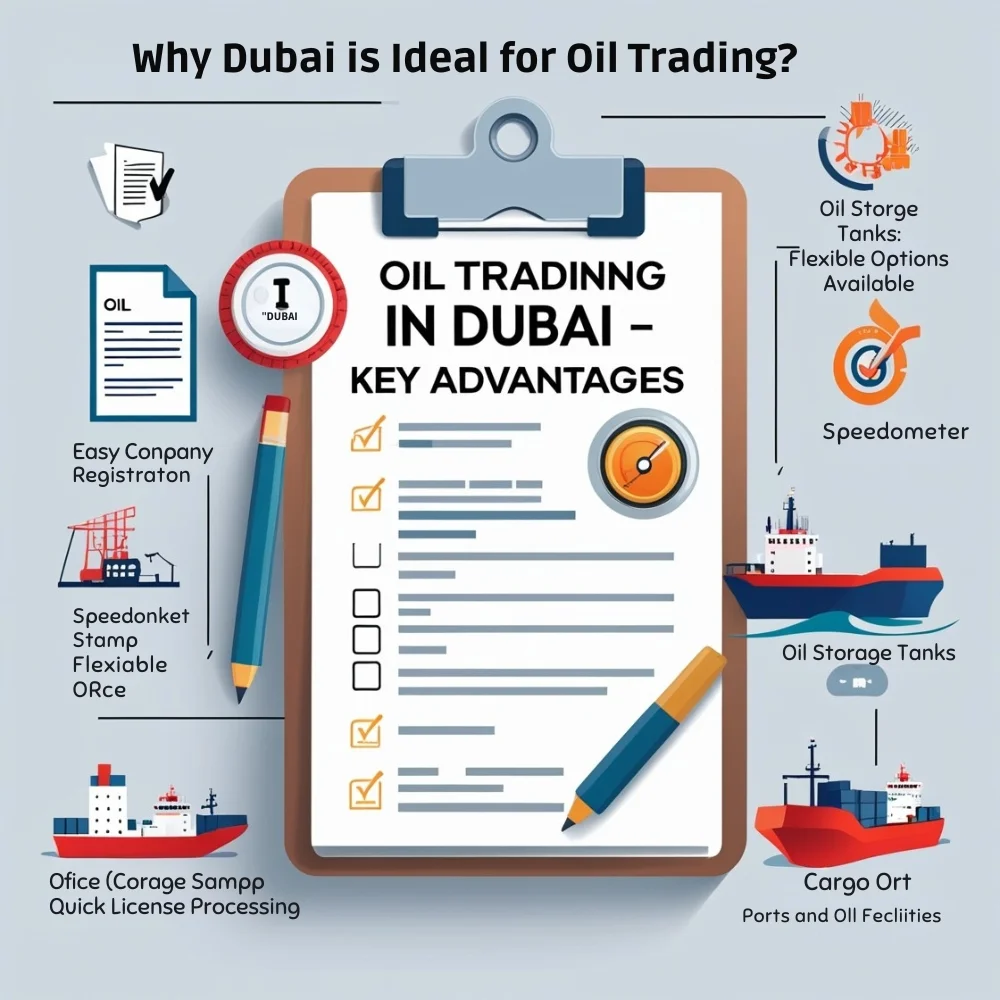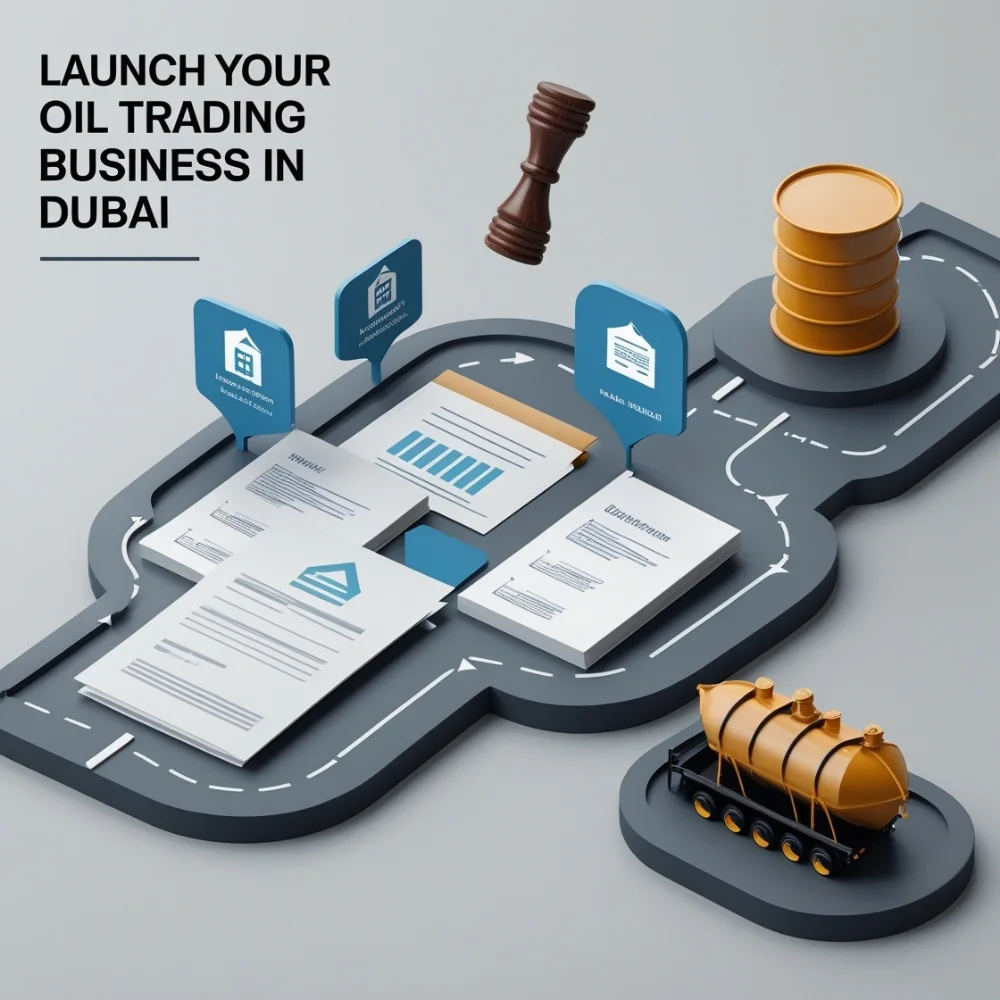
Dubai stands as a global hub for commerce, and one of its most promising sectors is oil trading. With strategic advantages, world-class infrastructure, and investor-friendly regulations, launching an oil trading business in Dubai is both profitable and achievable.
Why Dubai is Ideal for an Oil Trading Business?
Dubai’s location between Asia, Europe, and Africa makes it the perfect bridge for international energy trade. The city serves as a global UAE trading hub with direct access to global energy markets and vital shipping routes. Its Dubai logistics network, featuring cutting-edge ports like Jebel Ali and logistics zones such as JAFZA, supports seamless import, export, and storage of oil products. Dubai’s government continues to foster a business-friendly environment, offering tax incentives, investor support, and world-class infrastructure.
1. Key Advantages
- Strategic location connecting three continents
- Access to global oil markets and shipping networks
- Advanced infrastructure tailored to energy exports
- A supportive regulatory framework for the Dubai oil market
Key Benefits of Starting an Oil Trading Business in Dubai
Starting an oil trading business in Dubai comes with a range of strategic advantages that make it one of the most attractive locations in the world for energy-related ventures. Here’s an in-depth look at the major benefits you can expect:
1. 100% Foreign Ownership in Free Zones
Dubai offers complete foreign ownership in designated Free Zones. This means international investors can retain full control of their oil trading company without needing a local partner. It simplifies business operations and decision-making, allowing entrepreneurs to build their enterprise on their terms.
2. Zero Personal and Corporate Income Tax
One of Dubai’s most compelling features is its tax-friendly environment. Oil trading companies established in Free Zones are exempt from personal and corporate income taxes. This allows entrepreneurs to maximize profits and reinvest more into business growth without the burden of heavy taxation.
3. Political and Economic Stability
The UAE is known for its secure and well-regulated environment. Its political stability and robust economic policies provide a reliable foundation for businesses to thrive, especially in sectors like oil trading that demand long-term consistency and trust.
4. Global Access to Financial Institutions
Dubai hosts a wide range of global banks, financial institutions, and trading companies. This global financial network gives oil traders access to funding, trade finance solutions, and seamless cross-border transactions. It also makes it easier to build international relationships and expand into new markets.
Additional Advantages

Dubai offers fast company setup, flexible office solutions, quick license approvals, and access to world-class ports and oil storage, ideal for efficient and global oil trade operations.
1. Easy Company Registration
Setting up an oil trading business in Dubai is straightforward, with simplified administrative processes and clear legal requirements. With the right consultancy support, registration can be completed quickly and efficiently.
2. Flexible Office Options
Dubai offers various office space solutions tailored to different business needs and budgets. Whether you need a virtual presence, a shared workspace, or a private office, Dubai’s infrastructure supports all models, making it easy to scale as your operations grow.
3. Quick License Processing
The licensing process in Dubai is fast and efficient. Depending on the jurisdiction (Free Zone or mainland), an oil trading license can be issued within days, allowing you to start operations without long delays.
4. Access to Oil Storage Facilities and Port Infrastructure
Dubai boasts world-class infrastructure, including state-of-the-art oil storage facilities, refineries, and deep-sea ports like Jebel Ali. These assets are critical for the smooth handling, storage, and transportation of oil products, making Dubai a central hub for global oil trade.
Legal Structures for Your Oil Trading Business
Choosing the right legal structure is key to running your oil trading business efficiently. Dubai offers three primary setups:
|
Legal Structure |
Ownership |
Ideal For |
|
Mainland |
Up to 100% | Local trade & UAE-wide operations |
|
Free Zone (e.g., DMCC) |
100% foreign-owned |
Global trading & tax efficiency |
|
Offshore |
100% foreign-owned |
Holding, asset protection, and global trade |
Licensing Requirements for an Oil Trading Business
You must obtain a valid license before operating your oil trading business. Licensing depends on the business structure and activities. You must get your chosen business activity approved by the appropriate licensing authority, like Dubai’s Department of Economic Development (DED). Required Approvals:
- Trade license from DMCC, JAFZA, or DED
- Customs and port operation permissions (if importing/exporting)
- Environmental and safety certifications
Simple Steps to Launch Your Oil Trading Business in Dubai
Here’s the simple step explanation in bullet points with headings used only for each bullet:
1. Decide on your legal structure
First, determine the most suitable legal structure, such as an LLC, sole proprietorship, or branch office. This decision affects ownership rights, liability, and compliance responsibilities based on your business goals and risk profile.
2. Choose the jurisdiction
You can register your company in the Mainland, Free Zone (like DMCC), or Offshore. Free Zones are popular for oil trading due to 100% foreign ownership, customs privileges, and tax exemptions. The mainland offers access to the local UAE market directly.
3. Reserve your business name
Select a business name that aligns with UAE naming rules, and avoid offensive, religious, or political terms. Submit the name for initial approval through DED (for Mainland) or the respective Free Zone portal, ensuring it’s available and legally acceptable.
4. Apply for an oil trading license in Dubai
Apply for a commercial oil trading license with the relevant authority. Submit necessary documents like passport copies, lease agreements, business plan, and company structure. This license legally allows you to buy and sell oil products.
5. Open a corporate bank account
Once your company is registered, approach a UAE bank to open a corporate account. You must provide copies of your trade license, identification documents (like Emirates ID if issued), and information about the company’s shareholders. A bank account is essential for receiving payments and managing funds.
6. Secure office space (physical or virtual)
UAE regulations require businesses to have a physical or virtual office. Choose based on your operational size—many Free Zones offer affordable co-working spaces, while larger firms may need a dedicated office to meet licensing requirements.
7. Register for VAT if applicable
If your business crosses the mandatory taxable income threshold, you are required to register for VAT with the Federal Tax Authority. Proper VAT registration ensures compliance and allows you to charge VAT on services while claiming input tax.
8. Apply for visas for employees and partners
Apply for UAE residence visas for all partners, owners, and staff. The procedure involves undergoing a medical examination, biometric scanning, applying for an Emirates ID, and completing visa stamping. You’ll need visas to legally live and work in the UAE under your company.
Documents Needed to Start Your Oil Trading Business

Here are the points only, without headings:
- Shareholder passport copies
- Proof of residential address
- Detailed business plan outlining trading scope
- Shareholder resolution (for multi-partner setups)
- Initial capital declaration
- No Objection Certificate (NOC) from the sponsor (if applicable)
- Emirates ID (for residents)
- Memorandum of Association (MOA)
- Lease agreement (Ejari for Mainland businesses)
Common Challenges and How to Avoid Them
While Dubai is welcoming to foreign investors, setting up an oil trading business comes with its share of challenges:
- Complicated licensing laws
- Choosing the wrong jurisdiction
- Limited market knowledge
- Issues with customs or trade documentation
- VAT and taxation errors
1. How to Avoid Them
Here’s a clear explanation of each point on how to avoid common mistakes when starting an oil trading business in Dubai:
1. Work with a business consultancy like Lukadah
Partnering with experts helps you navigate complex legal, licensing, and operational processes correctly from the start, saving time and avoiding costly errors.
2. Select the correct Free Zone (e.g., DMCC)
Choosing the right Free Zone, such as DMCC, ensures your business aligns with oil trading regulations and benefits from sector-specific support and infrastructure.
3. Stay updated on UAE trade regulations and compliance
Regularly reviewing updates from regulatory bodies helps you stay compliant and avoid fines or license issues that may arise due to changing laws.
4. Understand the specifics of Dubai customs procedures
Knowing how customs clearance works for oil products ensures smoother import/export processes and prevents shipment delays or penalties.
Start Oil Trading Business with LUKADAH
At Lukadah.com, we help entrepreneurs launch and grow oil trading businesses in Dubai. From Free Zone setup and licensing to bank account opening, visa support, and ongoing compliance, we handle it all. With us, you build more than a company; you build a solid future in global oil trade.
FAQ
1. Which jurisdiction is most suitable for starting an oil trading business in Dubai?
Free Zones like DMCC are ideal for oil trading due to 100% foreign ownership, tax advantages, and specialized infrastructure for commodities and energy-related businesses.
2. Is having an office space mandatory to start an oil trading business in Dubai?
Yes, UAE law requires businesses to have an office address. You can choose from virtual, shared, or private office spaces, depending on your budget and licensing requirements.
3. What licenses are required for oil trading in Dubai?
You’ll need a trade license from the relevant authority, such as DMCC, JAFZA, or DED, along with necessary approvals for customs, safety, and environmental compliance.
4. What documents are required to register an oil trading company?
Key documents include shareholder passport copies, a business plan, MOA, proof of address, Emirates ID (if applicable), and a lease agreement (Ejari for Mainland setups).
5. How does Lukadah support the setup of an oil trading business in Dubai?
Lukadah offers complete setup services from Free Zone registration and licensing to bank account opening, visa processing, and ongoing compliance, ensuring a smooth launch and long-term success.
Conclusion
Dubai is the gateway to the global energy market, and launching your oil trading business here opens doors to long-term success. With its strategic location, investor-friendly policies, and world-class infrastructure, it’s the smart choice for serious energy traders. By choosing the right structure, staying compliant, and getting expert support from a team like Lukadah, you can position your oil trading business for sustainable growth in one of the world’s most powerful trade hubs.
Related Topics:
